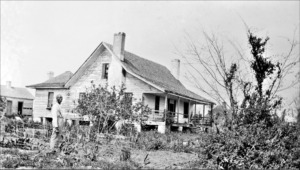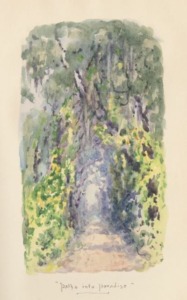Using unique material from the Lenox Library’s archival collections and other primary sources, Local History Librarian Amy Lafave gave a presentation titled “When I think, I must speak:” The World Stage of Fanny Kemble. A voiceover adaptation of the PowerPoint may be viewed on the Lenox Library YouTube Channel:
British actress Frances Anne “Fanny” Kemble gave a reading of “As You Like It” in 1868, to benefit the Lenox Library. The event was staged at the county courthouse in Lenox; Judge Julius Rockwell lamented the inadequacy of the courtroom. Indeed, what is now the Library’s Dome Room was a far cry from London’s Covent Garden, where Kemble made her 1830 debut as Juliet. From theaters up and down the Atlantic Seaboard, to the drawing rooms of her Berkshire friends, Fanny’s feet avoided one set of boards: the abolitionist’s soapbox – until history gave her no choice.
In 1834, Kemble married Pierce Butler, owner of several hundred enslaved people. She described her face to face experience with those who lacked the “bare name of freemen” in her Journal of a Residence on a Georgian Plantation. For the first time in her life, Kemble was stripped of her voice, in her role as obedient wife and mother. Ultimately, she could not sway her husband from the institution of slavery; their tumultuous 1849 divorce was national news.
During her American theater tour, Kemble had met novelist Catharine Sedgwick, who introduced Kemble to Lenox. When she came to visit, Kemble stayed at the Curtis Hotel; after her divorce, Charles Sedgwick (Catharine’s brother) found her a home on the new county road which would subsequently be named in her honor, Kemble Street.
 The vast majority of the 60 slides used in the presentation featured items from a collection donated to the Lenox Library by the family of Amelia Montague Watson [1856 – 1934]. Watson was an artist who had illustrated a gift edition of Henry Thoreau’s Cape Cod in 1896. Based on the donated items, it is clear that she wished to do the same for Kemble’s Georgian Journal.
The vast majority of the 60 slides used in the presentation featured items from a collection donated to the Lenox Library by the family of Amelia Montague Watson [1856 – 1934]. Watson was an artist who had illustrated a gift edition of Henry Thoreau’s Cape Cod in 1896. Based on the donated items, it is clear that she wished to do the same for Kemble’s Georgian Journal.
Watercolors from extra-illustrated editions of Kemble’s Journal, as well as the Journal of her daughter Fan were scanned on an Epson Expression 12000XL scanner. Negatives from the collection were scanned using the Epson’s transparency feature. The scanner was purchased with funds from a Library Services and Technology Act (LSTA) grant, with matching funds from a grant provided to the Local History Department by The Mr. and Mrs. Matthew D.M. Keator Family.
To learn more, check out these sources
The program was supported by federal funds provided by the Institute of Museum and Library Services and administered by the Massachusetts Board of Library Commissioners.

